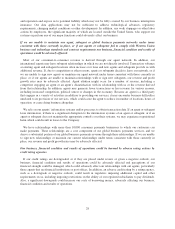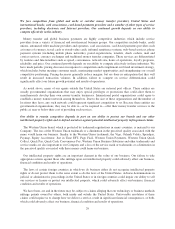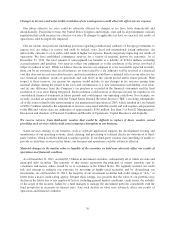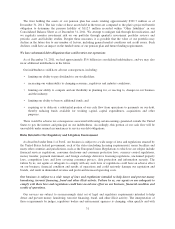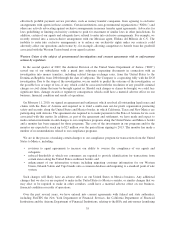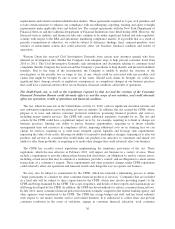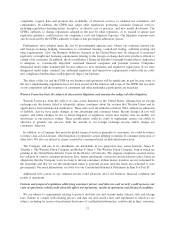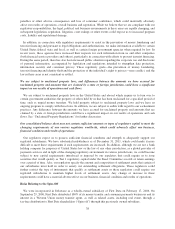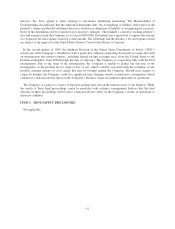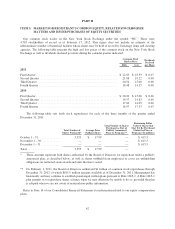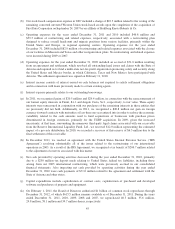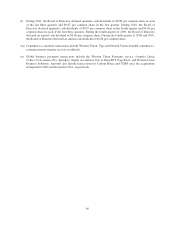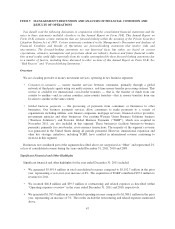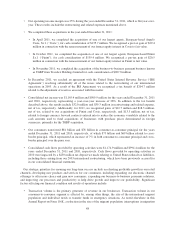Western Union 2011 Annual Report Download - page 45
Download and view the complete annual report
Please find page 45 of the 2011 Western Union annual report below. You can navigate through the pages in the report by either clicking on the pages listed below, or by using the keyword search tool below to find specific information within the annual report.penalties or other adverse consequences and loss of consumer confidence, which could materially adversely
affect our results of operations, overall business and reputation. While we believe that we are compliant with our
regulatory responsibilities, the legal, political and business environments in these areas are rapidly changing, and
subsequent legislation, regulation, litigation, court rulings or other events could expose us to increased program
costs, liability and reputational damage.
In addition, in connection with regulatory requirements to assist in the prevention of money laundering and
terrorist financing and pursuant to legal obligations and authorizations, we make information available to certain
United States federal, state and local, as well as certain foreign government agencies when required by law. In
recent years, these agencies have increased their requests for such information from us and other companies
(both financial service providers and others), particularly in connection with efforts to prevent terrorist financing.
During the same period, there has also been increased public attention regarding the corporate use and disclosure
of personal information, accompanied by legislation and regulations intended to strengthen data protection,
information security and consumer privacy. These regulatory goals—the prevention of money laundering,
terrorist financing and identity theft and the protection of the individual’s right to privacy—may conflict, and the
law in these areas is not consistent or settled.
We are subject to unclaimed property laws, and differences between the amounts we have accrued for
unclaimed property and amounts that are claimed by a state or foreign jurisdiction could have a significant
impact on our results of operations and cash flows.
We are subject to unclaimed property laws in the United States and abroad which require us to turn over to
certain government authorities the property of others held by us that has been unclaimed for a specified period of
time, such as unpaid money transfers. We hold property subject to unclaimed property laws and we have an
ongoing program to comply with those laws. In addition, we are subject to audits with regard to our escheatment
practices. Any difference between the amounts we have accrued for unclaimed property and amounts that are
claimed by a state or foreign jurisdiction could have a significant impact on our results of operations and cash
flows. See “Unclaimed Property Regulations” for further discussion.
Our consolidated balance sheet may not contain sufficient amounts or types of regulatory capital to meet the
changing requirements of our various regulators worldwide, which could adversely affect our business,
financial condition and results of operations.
Our regulators expect us to possess sufficient financial soundness and strength to adequately support our
regulated subsidiaries. We have substantial indebtedness as of December 31, 2011, which could make it more
difficult to meet these requirements if such requirements are increased. In addition, although we are not a bank
holding company for purposes of United States law or the law of any other jurisdiction, as a global provider of
payments services and in light of the changing regulatory environment in various jurisdictions, we could become
subject to new capital requirements introduced or imposed by our regulators that could require us to issue
securities that would qualify as Tier 1 regulatory capital under the Basel Committee accords or retain earnings
over a period of time. Also, our regulators specify the amount and composition of settlement assets that certain of
our subsidiaries must hold in order to satisfy our outstanding settlement obligations. These regulators could
further restrict the type of instruments that qualify as settlement assets or these regulators could require our
regulated subsidiaries to maintain higher levels of settlement assets. Any change or increase in these
requirements could have a material adverse effect on our business, financial condition and results of operations.
Risks Relating to the Spin-Off
We were incorporated in Delaware as a wholly-owned subsidiary of First Data on February 17, 2006. On
September 29, 2006, First Data distributed 100% of its money transfer and consumer payments businesses and its
interest in a Western Union money transfer agent, as well as related assets, including real estate, through a
tax-free distribution to First Data shareholders (“Spin-off”) through this previously owned subsidiary.
38


